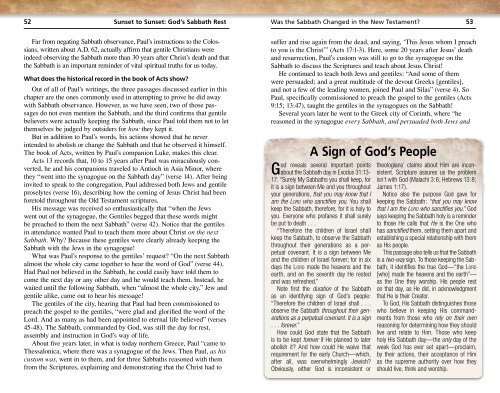Sunset to Sunset: God's Sabbath Rest - Messianic Singles Home
Sunset to Sunset: God's Sabbath Rest - Messianic Singles Home
Sunset to Sunset: God's Sabbath Rest - Messianic Singles Home
You also want an ePaper? Increase the reach of your titles
YUMPU automatically turns print PDFs into web optimized ePapers that Google loves.
52 <strong>Sunset</strong> <strong>to</strong> <strong>Sunset</strong>: God’s <strong>Sabbath</strong> <strong>Rest</strong> Was the <strong>Sabbath</strong> Changed in the New Testament?<br />
53<br />
Far from negating <strong>Sabbath</strong> observance, Paul’s instructions <strong>to</strong> the Colossians,<br />
written about A.D. 62, actually affirm that gentile Christians were<br />
indeed observing the <strong>Sabbath</strong> more than 30 years after Christ’s death and that<br />
the <strong>Sabbath</strong> is an important reminder of vital spiritual truths for us <strong>to</strong>day.<br />
What does the his<strong>to</strong>rical record in the book of Acts show?<br />
Out of all of Paul’s writings, the three passages discussed earlier in this<br />
chapter are the ones commonly used in attempting <strong>to</strong> prove he did away<br />
with <strong>Sabbath</strong> observance. However, as we have seen, two of those passages<br />
do not even mention the <strong>Sabbath</strong>, and the third confirms that gentile<br />
believers were actually keeping the <strong>Sabbath</strong>, since Paul <strong>to</strong>ld them not <strong>to</strong> let<br />
themselves be judged by outsiders for how they kept it.<br />
But in addition <strong>to</strong> Paul’s words, his actions showed that he never<br />
intended <strong>to</strong> abolish or change the <strong>Sabbath</strong> and that he observed it himself.<br />
The book of Acts, written by Paul’s companion Luke, makes this clear.<br />
Acts 13 records that, 10 <strong>to</strong> 15 years after Paul was miraculously converted,<br />
he and his companions traveled <strong>to</strong> Antioch in Asia Minor, where<br />
they “went in<strong>to</strong> the synagogue on the <strong>Sabbath</strong> day” (verse 14). After being<br />
invited <strong>to</strong> speak <strong>to</strong> the congregation, Paul addressed both Jews and gentile<br />
proselytes (verse 16), describing how the coming of Jesus Christ had been<br />
fore<strong>to</strong>ld throughout the Old Testament scriptures.<br />
His message was received so enthusiastically that “when the Jews<br />
went out of the synagogue, the Gentiles begged that these words might<br />
be preached <strong>to</strong> them the next <strong>Sabbath</strong>” (verse 42). Notice that the gentiles<br />
in attendance wanted Paul <strong>to</strong> teach them more about Christ on the next<br />
<strong>Sabbath</strong>. Why? Because these gentiles were clearly already keeping the<br />
<strong>Sabbath</strong> with the Jews in the synagogue!<br />
What was Paul’s response <strong>to</strong> the gentiles’ request? “On the next <strong>Sabbath</strong><br />
almost the whole city came <strong>to</strong>gether <strong>to</strong> hear the word of God” (verse 44).<br />
Had Paul not believed in the <strong>Sabbath</strong>, he could easily have <strong>to</strong>ld them <strong>to</strong><br />
come the next day or any other day and he would teach them. Instead, he<br />
waited until the following <strong>Sabbath</strong>, when “almost the whole city,” Jew and<br />
gentile alike, came out <strong>to</strong> hear his message!<br />
The gentiles of the city, hearing that Paul had been commissioned <strong>to</strong><br />
preach the gospel <strong>to</strong> the gentiles, “were glad and glorified the word of the<br />
Lord. And as many as had been appointed <strong>to</strong> eternal life believed” (verses<br />
45-48). The <strong>Sabbath</strong>, commanded by God, was still the day for rest,<br />
assembly and instruction in God’s way of life.<br />
About five years later, in what is <strong>to</strong>day northern Greece, Paul “came <strong>to</strong><br />
Thessalonica, where there was a synagogue of the Jews. Then Paul, as his<br />
cus<strong>to</strong>m was, went in <strong>to</strong> them, and for three <strong>Sabbath</strong>s reasoned with them<br />
from the Scriptures, explaining and demonstrating that the Christ had <strong>to</strong><br />
suffer and rise again from the dead, and saying, ‘This Jesus whom I preach<br />
<strong>to</strong> you is the Christ’” (Acts 17:1-3). Here, some 20 years after Jesus’ death<br />
and resurrection, Paul’s cus<strong>to</strong>m was still <strong>to</strong> go <strong>to</strong> the synagogue on the<br />
<strong>Sabbath</strong> <strong>to</strong> discuss the Scriptures and teach about Jesus Christ!<br />
He continued <strong>to</strong> teach both Jews and gentiles: “And some of them<br />
were persuaded; and a great multitude of the devout Greeks [gentiles],<br />
and not a few of the leading women, joined Paul and Silas” (verse 4). So<br />
Paul, specifically commissioned <strong>to</strong> preach the gospel <strong>to</strong> the gentiles (Acts<br />
9:15; 13:47), taught the gentiles in the synagogues on the <strong>Sabbath</strong>!<br />
Several years later he went <strong>to</strong> the Greek city of Corinth, where “he<br />
reasoned in the synagogue every <strong>Sabbath</strong>, and persuaded both Jews and<br />
A Sign of God’s People<br />
God reveals several important points<br />
about the <strong>Sabbath</strong> day in Exodus 31:13-<br />
17: “Surely My <strong>Sabbath</strong>s you shall keep, for<br />
it is a sign between Me and you throughout<br />
your generations, that you may know that I<br />
am the Lord who sanctifies you. You shall<br />
keep the <strong>Sabbath</strong>, therefore, for it is holy <strong>to</strong><br />
you. Everyone who profanes it shall surely<br />
be put <strong>to</strong> death . . .<br />
“Therefore the children of Israel shall<br />
keep the <strong>Sabbath</strong>, <strong>to</strong> observe the <strong>Sabbath</strong><br />
throughout their generations as a perpetual<br />
covenant. It is a sign between Me<br />
and the children of Israel forever; for in six<br />
days the Lord made the heavens and the<br />
earth, and on the seventh day He rested<br />
and was refreshed.”<br />
Note first the duration of the <strong>Sabbath</strong><br />
as an identifying sign of God’s people:<br />
“Therefore the children of Israel shall . . .<br />
observe the <strong>Sabbath</strong> throughout their generations<br />
as a perpetual covenant. It is a sign<br />
. . . forever.”<br />
How could God state that the <strong>Sabbath</strong><br />
is <strong>to</strong> be kept forever if He planned <strong>to</strong> later<br />
abolish it? And how could He waive that<br />
requirement for the early Church—which,<br />
after all, was overwhelmingly Jewish?<br />
Obviously, either God is inconsistent or<br />
theologians’ claims about Him are inconsistent.<br />
Scripture assures us the problem<br />
isn’t with God (Malachi 3:6; Hebrews 13:8;<br />
James 1:17).<br />
Notice also the purpose God gave for<br />
keeping the <strong>Sabbath</strong>: “that you may know<br />
that I am the Lord who sanctifies you.” God<br />
says keeping the <strong>Sabbath</strong> holy is a reminder<br />
<strong>to</strong> those He calls that He is the One who<br />
has sanctified them, setting them apart and<br />
establishing a special relationship with them<br />
as His people.<br />
This passage also tells us that the <strong>Sabbath</strong><br />
is a two-way sign. To those keeping the <strong>Sabbath</strong>,<br />
it identifies the true God—“the Lord<br />
[who] made the heavens and the earth”—<br />
as the One they worship. His people rest<br />
on that day, as He did, in acknowledgment<br />
that He is their Crea<strong>to</strong>r.<br />
To God, His <strong>Sabbath</strong> distinguishes those<br />
who believe in keeping His commandments<br />
from those who rely on their own<br />
reasoning for determining how they should<br />
live and relate <strong>to</strong> Him. Those who keep<br />
holy His <strong>Sabbath</strong> day—the only day of the<br />
week God has ever set apart—proclaim,<br />
by their actions, their acceptance of Him<br />
as the supreme authority over how they<br />
should live, think and worship.



